A day at the zoo
23 December 2009 | Children's books, Fiction
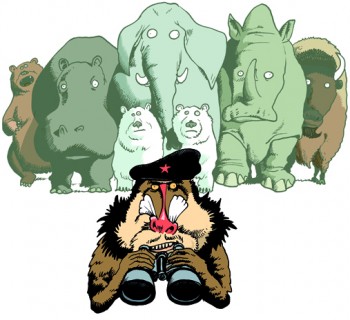
Extracts from the children’s book Zoo – eläimellinen tarina (‘Zoo – a bestial story’, WSOY, 2009, illustrated by Pertti Jarla)
The place: A zoo, once the property of the city, now privatised and accountable to corporate stockholders
The characters: The animals of the zoo, in particular Gandhi, a Sumatran tiger (false-teeth, poor vision, pacifist), Che, a male mandrill baboon (militant), and Mother Teresa, a hammer-headed bat (elderly); the zookeeper Sihvonen (stands up for the animals, recently fired); the new zoo director (whose main goal is to maximise profits); the shareholders’ committee (awaiting their earnings)
The action: after a demonstration in which all the animals played dead, the animals are staging a revolution to demand that Sihvonen be reinstated
![]()
The animals crowded into the foyer. The hallway was full of every kind of creature, with all of their skin, fur and feathers steaming in the warm indoor air. Che stood at the top of the the stairs, looked down at his troops, and gave the order in mime for everybody to be quiet.
‘Reconnaissance?’ he said, his voice subdued.
‘Ready!’ the leaf-tailed geckos announced.
‘Head in!’ Che commanded.
Silent as shadows, the lizards slipped under the door into the assembly hall, scattered, and climbed over the walls and ceiling, to get an impression of the overall tactical situation. A moment later they returned to the foyer and the group leader gave his report:
‘There are twenty of them – unarmed, by the looks of it.’
‘Roger!’ said Che. ‘Are the air divisions ready?’
The horned owl saluted with one wing.
‘Ready, comandante!’
‘Panzer division?’
‘Ready!’ the elephant said, and waved his lopsided ears to confirm (his mother was an African, his father an Indian elephant). The square-lipped rhinoceros, the African buffalo, both polar bears, and all the other animals weighing at least half a ton, stood beside him. Out of camaraderie, they had let the pygmy hippopotamus into the panzer division, too, although technically he was considerably underweight.
‘Good,’ Che said. ‘We’ll attack in pincer formation. You all know what you have to do. Hasta la victoria siempre – to battle, comrades!’
‘For the glory of God,’ Mother Teresa whispered.
‘And without bloodshed!’ Gandhi reminded them.
The owl and the other birds flew out and surrounded the building. The air forces had orders to assault the hall through the window, and Teresa was responsible for a special mission: to fly at the front of the formation and break the window with her hammer head.
Inside, the elephant listened intently, his larger ear pressed tightly against the door of the assembly hall. He listened and waited. And waited. And listened. The harvest mouse was so excited he got the hiccups. Che and the other animals looked at him disapprovingly, and the mouse had such a fright that his hiccups stopped. After several agonising seconds, the elephant finally heard the sound of breaking glass from inside the hall, and gave Che the signal.
‘Charge!’ Che commanded.

The elephant blew a fanfare and walked right through the closed door as if it were made of cardboard.
The entire infantry followed in a wave behind him – first the large animals, then the middle-sized ones, and finally the little ones. Meanwhile, birds of every size and colour flooded in the window, and both the air and ground divisions brayed, cackled, neighed, snarled, roared, bellowed, hissed, barked, howled, croaked, and grunted as loud as they could. The only thing missing was gunshots.
Chaos ensued. The director of the zoo and the shareholders were frozen in shock, unable to move, and stared in disbelief as the animals that had been lying dead as doornails in their cages just a moment before took over the hall.
Before any human had managed to make a move, Che yelled, ‘Dark forces – now!’
The alpaca, who had remained standing near the door according to plan, turned out the lights. It was completely dark. The humans and animals were suddenly blind and no one could take a step, let alone fight. No one, that is, except for the night animals, and the animals who didn’t need eyes.
Every able-bodied bug from the insect house swarmed over the shareholders in the dark and burrowed inside their clothes – six-legged, eight-legged, twelve and even thousand-legged creatures from every continent swarmed into their clothing, and night moths from every jungle buzzed around their ears.
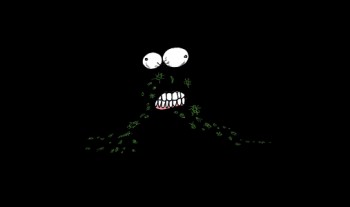
The humans flailed around, yelled and screamed, hoping that they would wake up from this nightmare, and they were so overcome with horror that they didn’t notice the nimble little hands untying the silken knots around their necks and stealing their neckties away into the darkness.
‘Let there be light!’ Che commanded.
The lights came on again. Che stood at the conference table like a commander on the heights. Once his eyes had adjusted to the light, he reviewed the situation:
The entire operation had lasted only a few moments, and was in all respects a complete victory. The surprise attack had played out in an exemplary fashion, and not a drop of blood had been shed – no one had even stepped on a bug in the dark. The take-over couldn’t have been more successful. Just one thing left to do…
‘Where’s Sihvonen?’ Gandhi asked.
The director was still lying on the floor but had recuperated enough to be able to speak again.
‘I will not negotiate with terrorists! What do you want?’
‘Give us Sihvonen!’ Gandhi demanded.
‘Zookeeper Sihvonen has no further business here,’ the director said. ‘His contract was terminated!’
‘Terminated?’ Che said, then repeated slowly. “Ter-mi-na-ted?’
It was so quiet in the hall that you could have heard a sparrow’s feather drop. The shareholders still didn’t comprehend what exactly was happening. They struggled in vain to free their hands from their silk restraints.
It took a moment before the animals understood the full desperateness of the situation: They had just won a major battle without any casualties, they had taken the director and shareholders prisoner, but they were too late. It had all been a waste of time. Sihvonen had been terminated. Sweet victory had turned into bitter defeat, they had lost their only friend.
Everyone looked at Che, who was feverishly contemplating his next step.
‘What do we do now?’ Gandhi asked, lifting his eyebrows.
Che’s colour had completely drained away, both in front and behind, and he looked at the shareholders with a strange gleam in his eye.
‘You’ll pay for this!’ he said, his voice devoid of expression. He didn’t turn his lips inside out, or yell, or beat his chest. Revenge is a dish best served cold. The other monkeys had never seen him in this state of mind. They withdrew a couple of steps in fear.
The shareholders began to perceive that the moment had arrived when the enraged flock of animals would tear them to pieces. Che was about to let hell loose – but the order died in his throat. The director had escaped from his necktie bonds and stood up behind Che. Before anyone could stop him, he grabbed the mandrill by the throat and started to choke him.
‘Surrender!’ the director yelled. ‘Surrender, you… animals!’
Che hadn’t had much time before the battle to rehearse the smaller details of the attack, and the young four-fingered mongoose hadn’t understood that human’s hands should always be tied behind their backs. Che coughed and bent over, trying to free himself from the director’s grip, but he didn’t have the strength to do it. All he could manage to do was to plead with Gandhi to help him.
The tiger’s blood in old Gandhi’s veins started to boil. Some ancient remembered feeling came into his mind. He saw in flashes a tropical jungle, bygone days of hunting and brawling. And Gandhi followed his large cat instincts, opened his mouth wide, like a predator, let out a real roar, leapt across the hall, oblivious of his creaky hips, and clamped his jaws on the director – more precisely, on his rear end.
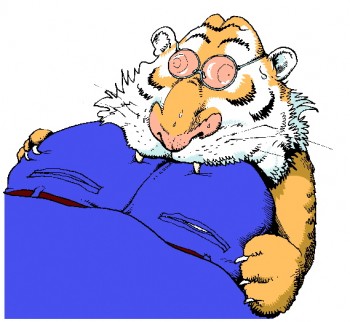
But just as he was shutting his mouth, a voice inside him told him to stop, and he left the bite off halfway. He held onto the director’s posterior but did no more than that. Che couldn’t believe what he was seeing. His eyes rolled and bulged out of his head.
‘Bite him!’ he gasped. ‘Bite him good!’
Gandhi’s stomach growled so loudly that everyone in the hall could hear it. The director’s flesh was so tempting in his mouth. It really did make him want to take a proper bite out of him. No, no, no. Gandhi remembered that violence makes animals human. He mustn’t give way to primitive aggression.
‘I can’t,’ he snarled. ‘I can’t do it.’
‘Bite him! For the sake of peace, if nothing else! Bite him!” Che’s voice was just a whisper now.
‘There is no road to peace, peace is the road,’ Gandhi said. He sighed and began to loosen his hold.
‘This circus is over!’ the director said, shaking the animals’ limp commander like a rag doll. ‘Get back in your cages immediately, or this monkey will die.’
The animals looked helplessly at each other, at Gandhi, at Che. What should they do? The most timid of them began to panic. A murmur went through the hall.
‘Perhaps in light of the current circumstances,’ said the owl. ‘we would do best to begin deliberations… That is to say, since Sihvonen is at this point is already terminated…’
‘Life is a struggle. Join the fight!’ said a delicate but decisive voice from above. Mother Teresa was fluttering defiantly, stretching her hammer head toward the director’s speaker’s stand. She had just woken up and hadn’t seen any of the battle. She thought the campaign had just begun.
Smack!
Mother Teresa collided with the chandelier that hung from the ceiling and fell toward the floor like a stone. The chandelier started to sway on its chain, and all eyes in the assembly hall followed it. Che, the director, and Gandhi, looked especially worried, because they were underneath it. After a tiny eternity, the chain broke, and the lamp plummeted downward.
It landed right on Gandhi’s large skull, which the tiger was still using to ponder the meaning of war and peace. Gandhi went out like a light, unaware that his jaw had closed under the weight of the chandelier and his dentures had sunk deep into the directors’ rear end like a hot knife through butter. He also didn’t notice that some sort of warm, sweet liquid had spurted into his mouth and hit his tastebuds.
The director let out a non-animal yell and let go of Che’s throat.
‘Thank God!’ Che said without thinking, immediately swallowing the words. It was a good thing Teresa was asleep again, and hadn’t heard him. The director screamed and tried to escape from Gandhi’s false teeth, which were still embedded in his caboose.
Luckily Gandhi’s head wasn’t just large and square, but also hard as a rock. Barely a few moments had passed before his large eyes opened again. They were still a bit crossed, though.
‘No violenth!’ he said. ‘No violenth unda any soocumstanthes!’ He was still a little dazed. His glasses had fallen on the floor. The elephant found them and set them back on his face.
‘Thankth,’ Gandhi said, but the world didn’t come into focus. The glasses were broken, there were just a few shards of thick glass left in the wire frames.
‘Whath in my mouf?” Gandhi mused. ‘It tathtes deliciouth.”
‘Merry Christmas everyone!’ a low voice suddenly said. Sihvonen had stepped through the broken-down doorway into the assembly hall. ‘What’s going on here?’ he asked, trying to comprehend what he was seeing.
‘Sihvonen!’ the director shouted. ‘It’s about time! Put these animals back in their cages immediately!’
‘Well, I don’t work here anymore, sir,’ Sihvonen said.
‘I was just kidding about that. Glad to have you back. Merry Christmas! I’ll give you a raise! Just get these animals out of here!’
The director took his hands from where they were holding onto his torn up backside and shredded pants and held them out in a gesture of reconciliation.
The colours had returned to Che’s face. He climbed back up on the table rubbing his throat, but before he could manage to announce the animals’ smashing victory, something strange happened to the elephant: Suddenly the large, grey animal fell on his side as if suffering from severe spasms. His lopsided ears flapped like rhubarb leaves in an autumn wind, his stomach churned and seethed, and his trunk lashed the floor like a fire hose that someone’s lost hold of. It looked like he was poisoned, or having an apoplectic stroke, or an epileptic fit. Or all three.
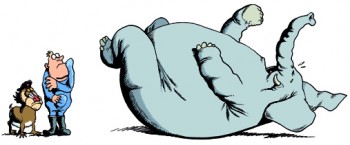
Sihvonen, the animals, the shareholders, and the director were aghast at the way he was thrashing about. Maybe he had swallowed something he shouldn’t have and choked on it, but no one was big enough to do the Heimlich manoeuvre on him to get the foreign object out of his windpipe. It was a long time before they realised that the spasms weren’t life-threatening – it was just a good, old-fashioned fit of laughter.
‘What’s so funny?’ Che asked with annoyance. ‘We’re kind of in the middle of something here! Could you be a little more serious?’
The elephant tried to calm down, but he couldn’t stop the laughter, which was bringing tears to his eyes. When he had finally collected himself a little, he trumpeted: ‘Look! Look!’ and started to laugh again, so hard that his animal friends were beginning to worry about him.
‘Look at what?’ Sihvonen asked.
The elephant pointed with his trunk at the director, whose pants were hanging in tatters around his ankles.
‘People laugh at my ears… ‘ the elephant yelled, his trunk in a twist.
‘So?’ said Gandhi.
‘… but look at what he uses to breathe with!’
Everyone looked. And when they realised what the elephant was talking about, they all burst out laughing – the animals, the shareholders, and Sihvonen, all at once and all together. And the laughter that burst out of them wasn’t any ordinary laughter, it was earthshaking laughter. The kind of laughter where your stomach starts to hurt but you still can’t stop laughing. They laughed and laughed and laughed until, after a long time, they were finally able to stop and catch their breath.
But because the elephant started to giggle again, quietly, the laughter got into everybody’s tummies again, and there was another attack of mirth. Everyone laughed until they hurt so much that they had to hold onto each other, both the people and the animals.
Everyone was laughing except for the director and Gandhi, who couldn’t see anything, and Mother Teresa, who had got quite a knock to the head.
![]()
The television and newspaper stories went around the world. ‘The Christmas Miracle at the Zoological Gardens’ was on everyone’s lips – the story of a zoo where all of the animals died mysteriously, and rose from the dead on the same day. The zoo was a tourist mecca now. Clubs and school field trips came by the busload, families with children formed long lines.
‘How is your memoir coming along?’ Sihvonen asked Che, who was sitting on the big boulder on monkey island, diligently tapping away at an old black typewriter.
‘Very well, thank you. It’s almost finished. I was thinking I would title it ‘The Silk War’, or ‘The Necktie Rebellion’. Which do you think is better, director?’
‘Just call me Sihvonen, like always,’ Sihvonen said. ‘It’s hard to decide. I think they both sound good.’
‘What happened to the old director, anyway?’ Che asked. ‘Was he terminated?’
‘Not at all,’ Sihvonen said, smiling. ‘He’s at an institution now.’
‘Ah! So he was sent to jail?’ Che asked, putting another piece of paper in the typewriter.
‘No. He’s the director of a nursing home now.’
![]()
Gandhi was lying spread out in his favourite spot, and around him romped all the little animal cubs and chicks and whelps who had been born at the zoo that spring. Gandhi realised that he had no right to keep his august life story to himself – he had a responsibility to share it with the next generation. So these days he had an afternoon meeting once a week for the young folks at the zoo. He was just coming to his favourite part of the story:
‘… and then I lifted my wounded comrade on my shoulders, threw a hand grenade into the enemy trench, and charged, with just one cartridge left.’ He paused for a moment and cleaned his new designer glasses.
‘That’s what it was like at the Battle of Stalingrad,’ he said in conclusion. ‘Many a good animal never returned.’
‘Last week he said it was at Waterloo!’ Sihvonen thought as he sidled over to the barn in rubber boots that were slightly too large for him. The dormouse had a tummy ache. He should get him some pretzels and soda.
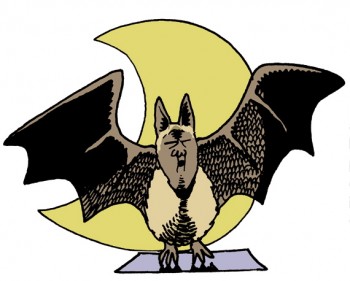
Mother Teresa. Illustration: Pertti Jarla
Translated by Lola Rogers
Tags: children's books, novel
2 comments:

1 September 2012 on 12:02 pm
…an old flash from my distant childhood when I used to read a fairy-tale called the Big ones and the little ones, considering animals in Africa trying to survive together despite their differences. 9 points out of 10. I wish the illustration of Finnish books could be more like Disney style, nice and beauty…
21 June 2016 on 12:23 am
I really wish I could translate these amazing Finnish stories for the Moroccan kids into Arabic.
Sincerely yours
Sabry Aziz
English language teacher
Casablanca morocco